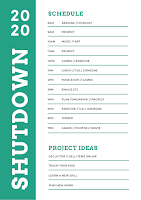Suddenly we're spending a lot more time at home. Sometimes we're unsure what to do with our time.
We didn't choose for this to happen, but we can choose how we deal with it.
Click the image for a larger version to download, and see below for more details.
If you're now schooling your kids at home, here a some handy resources:
We didn't choose for this to happen, but we can choose how we deal with it.
Shutdown Schedule
Here's my daily planner template. It's flexible so feel free to move things around and put other things in. The main idea is that it gives you a default activity to be doing at any given time.Click the image for a larger version to download, and see below for more details.
Key Actions
I've designed this to give us the things we'll miss while being at home all the time.Purpose
Find a project that you want to work on. Time will pass quicker if you're working towards a goal. There are some suggestions in the planner. You may have some of your own.Joy
Events and activities have been cancelled, but we can make our own fun. I've included some time for playing (or listening to) music, playing games (I still love Uno) or watching a movie. You might choose doing art or looking back on old photos.Social interaction
There are two prompts to call someone. Not a text, or an email - though you can do that too - but an actual phone call. The sound of someone's voice and physically having a conversation is good for us at this time.Exercise
For mental exercise I've included an hour for a podcast or reading a book (here are my book reviews). There's two prompts to do physical exercise. It can be a run, if that's OK where you live, some frisbee in the backyard, a work-out in your garage or even gardening. The idea is to get some healthy movement into the day.Project ideas
If you are taking up the decluttering and selling unwanted items, here's my guide to selling items online. An average household could make thousands. Having less stuff can also save you even more again. See how decluttering is currently saving us thousands.If you're now schooling your kids at home, here a some handy resources:
- 3P Learning (creators of Reading Eggs) have free resources for various subjects. Also, now might be a good time to try one of their 14-day free trials.
- Choose FI have a resource called The Accidental Homeschooler. Naturally it has a slight emphasis on teaching kids financial literacy.
- Thrive Art School is putting up its learn-to-draw videos for free during this time.



Comments
Post a Comment